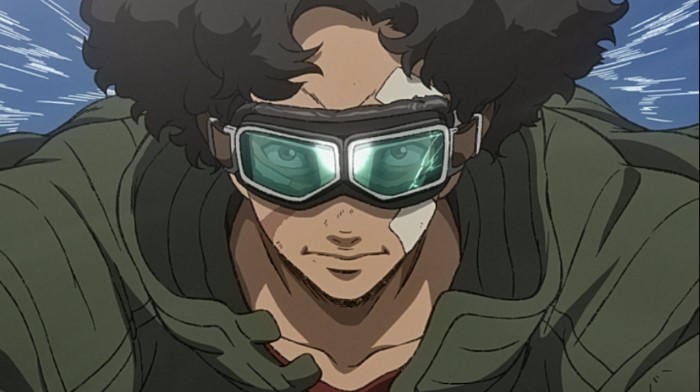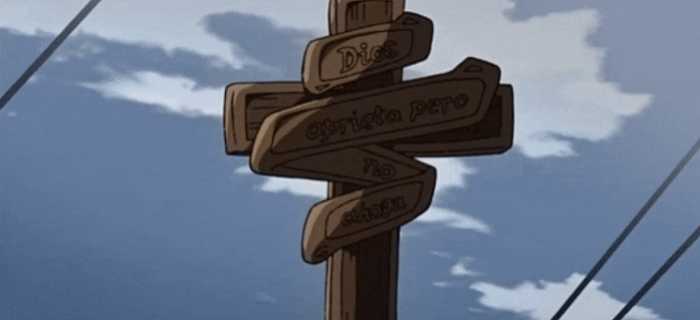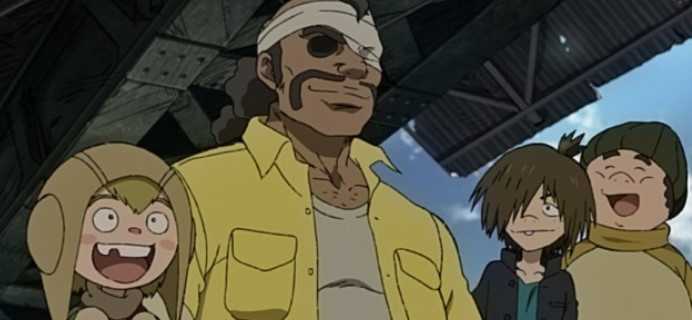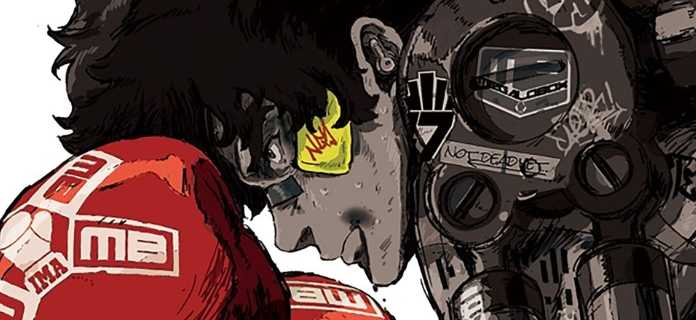Megalobox and the Undocumented Story

Megalobox follows the journey of an initially unnamed protagonist, known by his ring name “Junk Dog.” The fighting style within Megalobox can be thought of as mecha-boxing, where fighters use techniques used in real boxing; however, they have mechanical arms attached to their body that increases the stopping power of their punches. Junk Dog fights in underground megalobox matches. At the start of the anime he is forced to suppress his desire to win fights and purposefully loses fights for the profit of his coach and manager. In many ways, the life of Junk Dog mirrors the lives of undocumented immigrants within the United States of America.
An undocumented immigrant is an individual who is not legally residing within the country as a citizen, either natural born, naturalized, or otherwise as a legal resident with a visa or green card. Undocumented immigrants often live under the radar. You wouldn’t know they are undocumented unless they told you. Data gathered in 2017 from the Pew Research Center 1 notes that there are about “10.5 million unauthorized immigrants” living in the United States of America . Given their status many have to work under the table, acquire fake social security numbers, or have fraudulent identities to work within the country. In a similar way, Junk Dog shares this undocumented status within the fictional world of Megalobox.
Later in the anime, Junk Dog acquires fraudulent citizenship documentation to fight in the Megalonia megalobox tournament, and changes his name to Joe. It is clear from the first episode that Joe is not a citizen of the land he resides in. There is a moment where Yukiko Shirato, CEO of Shirato Konzern and promoter of the Megalonia megalobox tournament, states on a television broadcast that entry into Megalonia is open to all citizens. Junk Dog listens to her statement with disdain on his face, hinting to the viewer that he is not eligible to enter due to his citizenship status. Following the idea that Junk Dog represents undocumented immigrant story, it seems that the anime’s creators may also hint that his character may specifically be inspired by undocumented immigrants of Latin American descent. It would be difficult to say for sure, but Joe’s experience may most closely resemble the experience of a Mexican immigrant. Though this is ultimately up to the viewer’s interpretation.
Throughout the anime there are a few small details that make this cultural allusion. Though not much of Joe’s cultural background is shared in the storyline, the show’s use of Spanish words, Joe’s tan complexion, and Christian imagery point to cultural and ethnic attributes that some Latin Americans share. In fact, most of the countries in Latin America use Spanish as the primary language. 2 The exceptions here being Brazil, Belize, Guyana, Suriname, and French Guiana, which use other languages such as Portuguese, English, and French. Throughout Latin American there are also many indigenous dialects that are used in smaller communities. Also, while Christianity is considered a world religion, Mexico specifically, 3 holds the word’s the third largest population of Christians.

Analyzing the Pew Research Data 4 of undocumented immigrant demographics in the United States of America further shows that Mexicans make up the largest undocumented immigrant group, with about 4.9 million people living in the country. Having some inspiration from the Mexican people would make sense since boxing is also a coveted sport in Mexico. Mexico is the second country in the world with the most boxing champions, the first being the United States of America. 5
Like the real people Joe is inspired by, he has the odds stacked against him. As an undocumented citizen, he lacks resources and makes a living throwing megaloboxing matches. This also means putting aside his pride and real skills as a fighter to make ends meet. Due to his less fortunate societal circumstances, there is little hope for Joe’s upward socio-economic mobility. However, there is a point in the anime where Joe is forced to find a way to overcome his situation. This happens when Joe meets Yuri, the current megalobox champion.
Yuri is cocky and seems to think little of Joe during their first encounter, except for when Joe trash talks about the megalonia tournament to Yukiko Shirato. This triggers Yuri, but Yukiko prevents the two from fighting in the street. Later, Yuri finds Joe in the underground ring where he throws his fights, and challenges him there. Joe resolves to fight for a win, which is contrary to the cycle of throwing matches that he and his coach Nanbu are accustomed to doing. Joe is easily beaten by Yuri. This is the main turning point for Joe that launches a series of events to where Joe has to somehow make it into the megalonia tournament by defeating strong opponents and receiving fraudulent citizenship.
It’s unclear why the creators of the anime decided on this to be the socioeconomic context of the main character. Especially since the manga it is based on Ashita no Joe, which takes place in Japan. Consequently, the anime becomes a commentary of the lives of undocumented immigrants. For Joe, one thing is certain, like the real people who he represents, he has the odds stacked against him. When his life goal is made clear, to beat Yuri and become champion, he is the definition of someone who started with nothing, yet has the internal ingredients that make up a legend.

In a sport like boxing, things like socioeconomic status can mean nothing at all, yet mean everything at the same time. It means nothing in the sense that, when fighters are in the ring it doesn’t matter if one fighter is from Beverly hills and the other is from the outskirts of Tijuana. Skill becomes the grand equalizer. A real life example of this is Mexican boxing legend Julio Cesar Chavez. Chavez was one of ten siblings. 6 His family was so poor that they lived out of an old rail car when he was young. 7 Poverty was one of Chavez’s motivations for fighting, as he started his boxing career with the intention to raise money for his family. In some ways, having nothing was the greatest strength for Chavez since he had nothing to lose, there were no limits he mentally placed on himself. Chavez once held an undefeated record of 89-0, one of the longest standing undefeated records in boxing. At the end of his career, he still maintained an impressive record of 107 wins, 6 losses, and 2 draws. 8 In Chavez’s situation, he shows that humble beginnings prove to be one of the contributing factors for success. Though Chavez was not an immigrant, the theme of starting from nothing mirrors Joe’s experience.
Creators of the anime further emphasize this by adding details to the story line to show how Joe truly starts from nothing and overcomes these odds. Joe starts his professional career “gearless” meaning that he doesn’t use the iconic technology used by megaloboxers to power up his skills. On the other hand, his opponents stick to using their high-tech gear that should make them stronger and faster than Joe. However, Joe uses his talent, training, and skill to defeat every opponent. At the beginning of the show, Joe also had no support system. But later receives proper training from Nanbu, who despite having real experience in the boxing world, used to use Joe to throw fights and win gambling money. In addition, a group of young orphans join Joe’s corner team, help with his training, and see his development throughout the storyline. At the end of the season 1, his progress and skill are acknowledged by Yuri who also decides to fight Joe gearless in the championship match of the megalonia tournament.

Joe’s triumphant victory over Yuri demonstrates how an underdog can in fact become a top dog, as long as one has a never-give-up attitude. Season 2 of Megalobox, focuses less on Joe, but continues to touch on elements of unauthorized immigration. All of the season’s episode titles are in Spanish and themes of faith are also present. Joe even finds himself helping out a community of undocumented immigrants who are faced with discrimination and government persecution. Whether intended to or not, Megalobox and Joe are a homage to the many unnamed people out there on the outskirts of society who overcome daily struggles, perhaps not boxing, but still fighting for their survival.

Works Cited
- Lopez, M. H., Passel, J. S., & Cohn, D. (2021, April 13). Key facts about the changing U.S. unauthorized immigrant population. Pew Research Center. https://www.pewresearch.org/fact-tank/2021/04/13/key-facts-about-the-changing-u-s-unauthorized-immigrant-population/ ↩
- Spanishdict.com. (n.d.). Spanish-speaking Countries. SpanishDict. https://www.spanishdict.com/guide/spanish-speaking-countries ↩
- World Population Review. (2021). Most Christian Countries 2020. Worldpopulationreview.com. https://worldpopulationreview.com/country-rankings/most-christian-countries ↩
- Lopez, M. H. ↩
- WBN. (2021, January 15). Data shows which country has had most boxing world champions in history. WBN – World Boxing News. https://www.worldboxingnews.net/2021/01/15/boxing-world-champions-history/ ↩
- TheFamousPeople.com. (n.d.). Who is Julio Cesar Chavez? Everything You Need to Know. Www.thefamouspeople.com. Retrieved December 27, 2022, from https://www.thefamouspeople.com/profiles/julio-cesar-chavez-3368.php ↩
- DAZN. (2022, July 12). Julio Cesar Chavez: five facts about the Mexican champion you didn’t know | DAZN News US. DAZN. https://www.dazn.com/en-US/news/boxing/julio-cesar-chavez-five-facts-about-the-mexican-champion-you-didnt-know/zq9pqar2s4g213lqvrje4p1l3 ↩
- BoxRec: Julio Cesar Chavez. (2019). Boxrec.com. https://boxrec.com/en/proboxer/8119 ↩
What do you think? Leave a comment.











Megalo is painfully undrrated. Fighting my own demons and being at a terrible state in my life, 2nd season really, REALLY spoke to me.
Hear, hear. Season 2 just completely blows season 1 out of the water, and it’s gone on to be one of my all time favorites. Couple that with how much I connected to and felt this season due to my own stuff going on, megalobox is always going to have a significant place in my heart and I’m not going to forget about it or its messages.
Megalo season 2 has been (as pathetic as it may sound) the main motivation for me to finally get my life on track 🙂 I’m a far way away from getting where I need to be, but I truly am grateful for season 2. I’ll be sure to buy the box set, vinyl, and whatever merch I can officially buy once I have to funds to do so comfortably.
Megalo Box getting a sequel was much like The Last of Us getting a sequel. TMS just actually came up with a story worth telling/a story that makes the first outing look almost like it was made to just be the foundation of the sequel.
It’s really cool to see the perspective of this story through a different lens cause I always saw this as just trying to find yourself after the person you once were can no longer survive. I love this analysis!
From the themes of immigration, the actual use of Spanish, the music itself in the series, feels like it’s referencing Latin America, especially Chief, Marla and the whole Casa group.
You’d be correct. It does reference mexican culture.
Loved both seasons of this and man the second season, watching him beat his demons back.
I really love how joe loses the last fight, for real. it really nails down the point that joe is practicing boxing as a sport instead of a as horrible coping mechanism. Which i think is beautiful.
If I would go in a boxing anime…I would rather go watch “Hajime No Ippo”.. at least it is much realistic and each fighters fight for skills and a fair fight.. rather than one has a disadvantage over a boxing match…
I’m a boxing lover and an anime lover the way they capture the fighting style and have a compelling story is amazing, one of a kind honestly and season 2 took it to another level. Dont sleep on season 2.
Took we a while to get to this show but I can say, I’m still shocked Oicho is a girl.
Reading this after Nomad and honestly, I wasn’t that totally convinced by the first season. It’s Nomad that absolutely swept me off my feet.
The Latin immigrant themes as well as the subtle discussion of CTE was absolutely wild to see in an anime and just pulled this series up completely from being pretty damn good to “Wow”.
After watching Megalo Box in proximity with things like Kabaneri of the Iron Fortress and Gundam Unicorn, I could hardly watch anything that doesn’t look like those.
Season two has been the best new thing I’ve watched recently. It’s incredible how much they’ve managed to tell using the previously stablished framework.
Perfect timing I just finished watching this. Great analysis.
Always glad to see more people who appreciate the touching grace of the Megalobox series.
Reading this take made me realize why I was so touched by the characters’ healing journey. Seeing this part of the experience of unnamed people visualized so beautifully in an anime makes me really happy, since it’s so rare in that medium specifically.
I always thought about the show as a guy struggling against all the odds to overcome and succeed I never thought about the aspect of immigration in it and undertones of the characters actions.
Megalo Box season 2 is an actual masterpiece, and such an achievement – for a sequel no one really asked for to elevate a show so much and grow so perfectly from the first. The way the themes were developed was incredible.
I loved this show. As a shitty amateur fighter I felt like it did an incredible job of capturing the emotional experience of competition as well as provided a very frank look at where fighters tend to end up near the end of their careers.
This actually one of the greatest animes ever in my opinion.
I have just finished season one and I’m now starting nomad, this anime is now one of my favorites! It hit realllly hard!
S2 was even better imo. Less boxing emphasis and a greater emphasis on the characters. Frikkin loved it.
Great read. Everyone talks about the art style but the story is gold and not to mention a great range of characters of all color and shape. Coming from poverty and seeing joe literally fight his way to fame is something I dont think we see much in anime so I do love how joe carried the soul of the poor and working class throughout the show being a symbol that coming out of nothing doesn’t mean you can’t be something. Not to mention he is shown to have all the support of others along the way.
Finally got around to watching this one. WTF was that ending?
It wasn’t about who lost or won, it was about the fight itself, the fight was the goal. The reason the final ep was called “Round final “Time to die”” was because it was time for the goal to die, no need to complete living after fulfilling its purpose
I love the show but there’s plot holes involving joe’s gear he first fought without gear because of necessity pops accidentally fries joe’s gear and their replacement malfunctions and has to be destroyed to save joe the show ignores this later on even having joe wear his gear again even though it was destroyed a long time ago.
I love this anime, and the last fight was something no one saw coming.
The themes in the show were weak. I mean you should throw them out entirely. None of them or actually proven to be true if you really sit down and think about it. Even the underdog theme is disregarded at the end.
One major theme that they seem to be going for is that it’s impossible to change your nature. But that through hard work you can if you believe in yourself. Despite our heavily they try to played out in the scene where he supposed to throw the main boxing match and he decides not to. This was not shown to be true. Despite the fact that the villain was saying it so clearly. What had actually happened was he misinterpreted their nature. It wasn’t that they Could change it it was that the villain did not understand their nature to begin with. He fundamentally did not understand their enjoyment for the sport nor what this sport meant ment for them. Nor did he understand the coaches Reasoning for being into boxing to begin with or why he was a coach. It’s clear he knows his past but hes decided he understands his nature which was wrong and that was proven to him. The main character never changes his approach to things his attitude his cocky smile any part of his nature. all that happened was he was finally able to express his love for the sport and a professional ring where it meant something and so a he took the chance because that was in his nature.
As an aspiring martial artist working fulltime to pay bills currently training in karate and muay thai and eyeing a potential first amateur match in the near future the character of Joe really resonates with me because I feel that deep need to prove myself out there and see how far I can go. I have doubts of course about how successful I can be but it’ll drive me nuts if I don’t experience it at least once. Joe’s drive to get to Megalolonia was inspiring. If I ever to get into the ring someday I’m definitely walking out to something from this soundtrack.
I love Megalobox’s soundtrack. They recently released the full album on Spotify and I’ve been listening to it non-stop ever since. Some of my favorite tracks include “Theme of Pepe Iglesias,” “Enter the Arena,” “The Slum” and “Resolution” along with all the rap songs by COMA-CHI. I’d recommend that anyone who’s interested check it out, you will not be dissapointed.
Nomad came out with more bangers.
I liked this Anime for the lack of cliches and overused stylistic devices that can be found in almost every mainstream Anime series. The griddy characters, the pale color scheme, the music and the maturity really made it stand out from all other current shows. However, there is a huge issue with this show. The actual boxing. I’m sorry but anyone who has ever watched a real boxing match knows that this anime is full of crap.
It strives to be realistic in its screenplay and its plot but fails to be realistic in the ring. I mean how many fights did Joe have where he gets plastered with punches and falls to the ground, just to stand back up in the last second to knock out his opponent? This shit doesn’t happen in real fights. Also there was also this weird impression that you’ve got to have a masterplan to beat your opponent. That’s not how boxing works. You don’t get beat up for 10 rounds and then knock your opponent out with a special punch that you trained for a while. Only Muhammad Ali can do that and Joe ain’t Ali. All of the fights were completely predictable and were probably choreographed by someone who has never watched a boxing match. And in anticipation to the response that “the anime isn’t only about the fights”, the fights and the training takes up a big chunk of the total run time. I understand that the producers only have a limited budget but if you are going to make the fights a central point in your series, it should at least look good.
If you loved megalo box, please check ashita no joe it’s the reason megalo box exists.
I think the art style was like that because it’s there as an anniversary of Ashita no Joe a 70s boxing anime. There are hella references too.
I miss hajime no ippo.
The writer does an excellent job of examining the character of Joe and his circumstances, as well as the broader context of undocumented immigrants in the United States. The article draws attention to the ways in which socioeconomic status can influence access to resources and opportunities in society.The writer provides insightful examples of real-life boxers, such as Julio Cesar Chavez, whose humble beginnings and poverty were significant factors in their success. These examples help to reinforce the idea that socioeconomic status can both help and hinder individuals in their pursuit of success.
Furthermore, the article does an excellent job of analyzing the impact of socioeconomic status on the main character, Joe. The writer explains how Joe’s lack of resources and his status as an undocumented citizen create significant challenges for him. These challenges are ultimately overcome through hard work, determination, and a never-give-up attitude. The writer shows how Joe’s character arc serves as an inspiration to those who are struggling in similar circumstances.
The writer’s use of research data to illustrate the demographics of undocumented immigrants in the United States is particularly effective. This information helps to contextualize the experiences of Joe and underscores the broader themes of the series. Overall, the article is well-written and thoughtfully constructed. It provides an insightful analysis of the socioeconomic themes present in Megalobox and illustrates the ways in which these themes resonate with real-life struggles faced by undocumented immigrants in the United States. The article offers a valuable contribution to the discourse surrounding socioeconomic status and its impact on individual success.